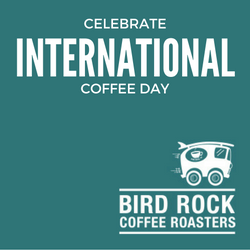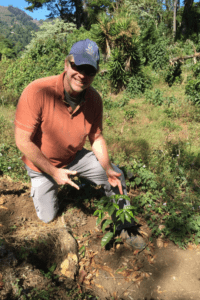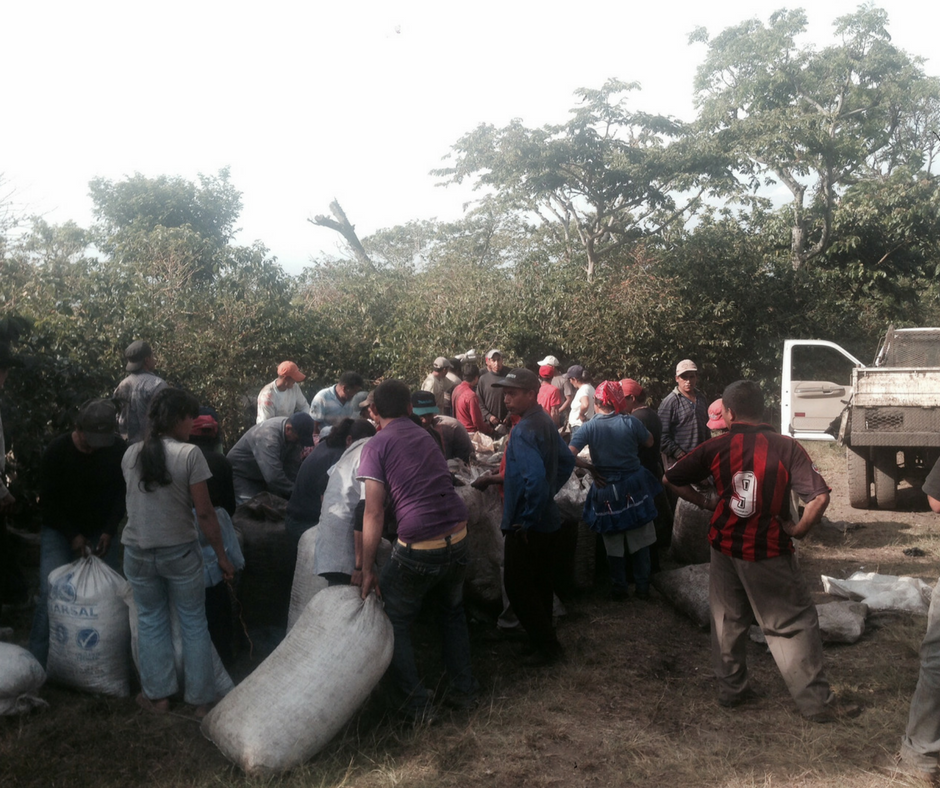
The following is a guest post from Elke Patton of La Jolla’s Bird Rock Coffee Roasters.
On September 29th, the US, along with many other countries, will celebrate International Coffee Day. This is not only a great excuse to indulge in your favorite coffee drink, but a great reminder to take a moment and reflect on how globally connected we are, and how a daily ritual can impact so many lives.
My husband and I own Bird Rock Coffee Roasters, and as an Economist I find that coffee is a never-ending area of interest. Coffee is the second largest commodity traded in the world after oil, and therefore, involves a complicated web of market and trade factors that establish the price of the coffee you drink. There is no way to drink local coffee in the continental US, but there are ways that your powers as a consumer can help your local community as well as the coffee origin community.
Commodity, Shmommodity
Last fall, we were featured in the Wall Street Journal as one of the few direct trade coffee companies in the US that was practicing bifurcation in pricing of the coffee commodity market. Most coffee is purchased as a commodity and priced as such. Growing a commodity or drilling for it, as in oil, is fraught with severe booms and busts related to market fluctuations. Just as we are seeing the huge drop in oil leave many communities in the Dakotas struggling, a drop in coffee prices can devastate whole coffee-producing countries.
 Bird Rock Coffee Roasters has been operating independently from the futures market almost since our inception. So, though the commodity price may have gone down from last year, Bird Rock Coffee Roasters will set the price paid to the farmer based on quality of the coffee crop, so the farmer may receive the same price as the previous year or better depending on that year’s crop quality. By decoupling our compensation to farmers from the prices set in the commodities market, we directly negotiate with farmers based on factors that benefit both the grower and Bird Rock Coffee Roasters. Economics professor Dr. Peter Roberts of Emory University Goizueta Business School, has written many great articles on this new structure of pricing and the positive affects on the coffee growing communities. We were very honored to be mentioned in his writings as well as to be a founding partner for his Transparent Trade Coffee website.
Bird Rock Coffee Roasters has been operating independently from the futures market almost since our inception. So, though the commodity price may have gone down from last year, Bird Rock Coffee Roasters will set the price paid to the farmer based on quality of the coffee crop, so the farmer may receive the same price as the previous year or better depending on that year’s crop quality. By decoupling our compensation to farmers from the prices set in the commodities market, we directly negotiate with farmers based on factors that benefit both the grower and Bird Rock Coffee Roasters. Economics professor Dr. Peter Roberts of Emory University Goizueta Business School, has written many great articles on this new structure of pricing and the positive affects on the coffee growing communities. We were very honored to be mentioned in his writings as well as to be a founding partner for his Transparent Trade Coffee website.
Because of a commitment to have a price that reflects the quality of the coffee and efforts of the farmer, and not by bets made by bankers on Wall Street, Bird Rock Coffee Roasters has created incentives for farmers to invest in their farms, improve their coffee varietal offerings and to grow sustainable coffee. These relationships and the focus on improving growing conditions for each farm have resulted in many awards for our coffee, including Micro Roaster of the Year, several Coffee Review scores above 90 and a Good Food Award this past January.
Can’t Spell Quality With an F (Fair Trade)

Since we are driven by the taste and quality of every coffee we serve, we have been critical of certifications that can mislead consumers. For example, though the Fair Trade Certification had the great intention of helping farmers negotiate a better price for their coffee, the unintended outcome was a subpar tasting coffee. Fair trade has no cup-quality component because coffees from several farms – some Fair Trade cooperatives have up to 1000 farming partners – are mixed together. Some of these farmers may be very good, but because their coffee is mixed in with average farmers, the end result is… average. And, while we like to assume Fair Trade farmers are very well compensated, this is often not the case. The price for Fair Trade coffee is based on the commodity price of coffee, meaning that many Fair Trade coffee farmers are kept in poverty under the Fair Trade model. Growing Fair Trade coffee is not a guaranteed path out of poverty for farmers.
In short, certifications like Fair Trade appeal to a consumer’s sense of altruism, trying to help those that farm coffee. At Bird Rock Coffee Roasters, our commitment to pay for coffee based on the quality rather than a bureaucratically designed method impacts farmers in a much more sustainable way.
To this day our founding Mission Statement starts with quality and recognized by leading institutions like Coffee Review, Roast Magazine and Good Foods, and not by third party eco-labels.
Local Impact
Several years ago I wrote on the multiplier effect of buying local for the local Bird Rock Community newsletter, and how shopping at non-chain stores can create dynamic and vibrant communities. Our three locations: in Bird Rock, Little Italy and Morena, all reflect the characteristics of those communities and continue to be a place for people to gather and meet. Over the past 10 years, we have been successful in creating a wonderful local environment and brand, have employed hundreds, and donated and volunteered our time and product to countless schools, universities, communities and non-profits in San Diego and beyond. From the beginning at the farms in Yemen, Indonesia or Guatemala to the customers in San Diego, we have threaded a sustainable, transparent and profitable connection that fuels us to take on one of the most challenging and intricate industries in the world.
Revolution In A Cup
Twitter and Facebook may have taken the place of coffee shops for starting revolutions, but I prefer the quiet revolution that is happening one farm at a time. I look forward to the next economic study: helping farmers go from growing commodity coffee to specialty coffee. The impacts to their local economies would be far greater than any new leader or government could achieve.
So, on International Coffee Day, I invite you to visit one of San Diego’s local coffee roasters, try a coffee or espresso without added sweeteners, and ask the staff to tell you the story behind that coffee.
Elke Patton has over 20 years experience in business analytics, operations, and management in the finance and technology industries. Her versatility in working with a variety of organizations is shown in her proven ability to improve operations, customer experiences, and employee performances in Fortune 500 companies, as well as small start-ups. This includes the three successful coffee businesses she co-owns with her husband in San Diego and helped turn into a nationally acclaimed, award-winning brand in a highly competitive coffee environment. Connect with them on Twitter @birdrockcoffee
Photo credit Chuck Patton
